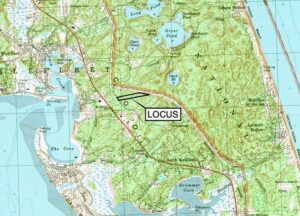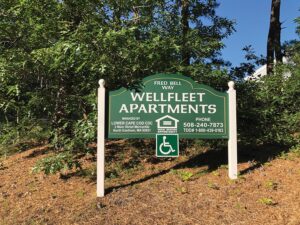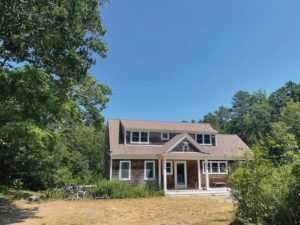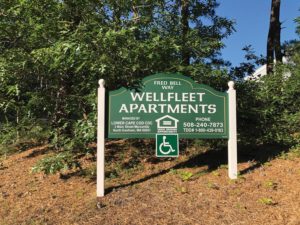WELLFLEET — Chellise Sexton and her son Kevin Sexton have failed again in their effort to wrest the land at Fred Bell Way from the town.
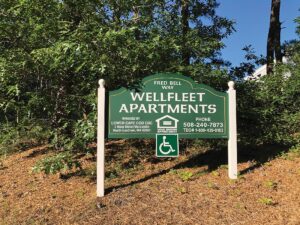
The Sextons have pursued the case through two separate courts over the last eight years, using a 100-year-old deed to support the claim that they are the rightful owners of the 8.6 acres off Old King’s Highway where a $1.5-million affordable housing complex has stood for more than 20 years. They lost their case in Land Court in December 2023 but filed an appeal.
The Mass. Appeals Court on June 23 denied the Sextons’ request to overturn the Land Court judge’s ruling that the boundaries cited in the their 1922 deed did not match the property at issue.
Based on the Sextons’ history of pursuing property owners through continued appeals in similar land claims, this might not be the final chapter of the story.
They still have an avenue of appeal, but it won’t be easy, according to Wellfleet Town Counsel Carolyn Murray of KP Law. “The Sextons could file a request for further appellate review with the Supreme Judicial Court, but that is not an automatic appeal,” Murray said in an email. “The SJC could decline to hear the appeal.”
The Sextons have 21 days from the June 23 Appeals Court decision to file a request for further review, Murray said, putting their deadline at July 14.
‘Why One Buys Title Insurance’
The Sextons’ legal challenge in this case dates back to 2017. That’s when they filed the suit in Land Court claiming that the town had mistaken the property off Old King’s Highway as the tract it had taken from Ralph Witcher in 1967 for nonpayment of real estate taxes.
In 1993, town meeting voters turned the land over to the Wellfleet Housing Authority to be used for affordable housing. The housing authority signed a 60-year lease with the Community Development Partnership (CDP) in 2001. The nonprofit organization then built 12 units of housing on the land and continues to manage the complex.
The Sextons claimed that the property the town owned was at a different location, one currently listed as belonging to the Cape Cod National Seashore, and not the location now known as Fred Bell Way.
In their suit, the Sextons asked the Land Court to award them title to the land, order the town off the property, invalidate a handful of utility easements, and award them damages for rents and profits connected to the town’s use of the land. If the court had agreed with the Sextons and invalidated the easements granted by the town, the decision would have also cut off the only access some homeowners on Delphi Path have to their properties.
In their complaint, the Sextons named several entities in addition to the Wellfleet Housing Authority, including the CDP, some utility companies, the state (because of the involvement of the Dept. of Housing and Community Development), and even the United States of America based on federal subsidies and affordability restrictions on the housing development.
Because the CDP has title insurance on the property, Boston attorney Zachary Berk was hired by the insurer to represent it and other entities connected to mortgages held by the company.
“This is why one buys title insurance,” said Jay Coburn, the CDP’s chief executive officer. It has been bearing the cost of this litigation, he said, “other than some staff time assembling records and documents for our attorneys.”
The town has also been spared the cost of defending its position, with Berk in the lead.
According to Murray, KP Law has thus far billed the town $86,968 for work related to the case.
After an exhaustive title search done by experts on both sides followed by a trial, Land Court Judge Robert Foster ruled on Dec. 28, 2023 that the 1922 deed used by the Sextons did not match the property in question, based on descriptions of abutting properties.
“Abutters’ calls serve as monuments when interpreting a deed,” Foster wrote in his decision. “These abutters’ calls manifestly do not describe the conveyed parcel in a manner to sufficiently locate it on the ground.”
A month after the Land Court decision, the Sextons filed an appeal with the state Appeals Court.
The panel of judges at the Appeals Court affirmed the lower court’s decision last month, saying an exhaustive study of the issue had been done by the Land Court.
Coburn expressed both relief and frustration at the latest development, saying the “frivolous” suit resulted in stress for the tenants in the affordable units.
“We’re really pleased that the court has upheld the lower court’s decision and hope it will bring an end to this challenge,” he said.
Other Sexton Exploits
Joe and Richard Healey and their sister Dorothy Gotreau lost a home at 120 Sapokonish Way in Wellfleet where the family had spent summers since the 1950s in a court battle with Chellise Sexton about 20 years ago. Reached by the Independent in 2022 for an earlier story, Gotreau said she had to cash in her life insurance policy to cover the legal expenses.
Both Sexton and the Healeys had deeds to the property traced back to Ralph Cook in the 1940s. Based on old documents, Cook sold the same land twice. In 1942, he sold it to William Fleming, who never used it but agreed to sell it to Sexton for $1,500 when approached in 2002 at age 92.
Cook sold that same piece of land to Earl Rich in 1945, three years after selling it to Fleming. Rich transferred the land to Alexander Healey in 1952. Healey, who built a camp there, then passed it down to his descendants.
Sexton filed a petition in Land Court in 2004 to clear the title, according to court documents, and the Healey family received summonses, saying they would have to defend their interest in the title.
Sexton, whose deed could be traced back to Cook in 1942 via Fleming, prevailed. The Healey family attempted to win the case by the doctrine of adverse possession, as they had used the property since the 1950s, but they lost because their use was limited to summers. The Healeys filed an appeal but they lost that also, in 2010.
The Sextons built a house on the Sapokonish Way property in 2012. The town assessors have set the current value of the house and land at $2 million.
The Sextons did not come out winners in a suit they filed in 2003, claiming ownership of some undeveloped land at 521 Old King’s Highway owned by Alfred Pickard Jr. In that case, after a costly three-year court battle, Pickard prevailed.
$1 Million and 20 Years
The most notorious of Chellise Sexton’s legal fights involved 30 acres off Old King’s Highway known as Paine’s Campground, owned and operated by Robert and Cynthia Paine beginning in the 1950s.
Because the property consisted of several lots and the couple didn’t have clear title to some sections of it, the Paines filed a petition in Land Court in 1999 to assert title to the entire property. Their son, Robert, who is known as Buddy, became the owner of the land and the petitioner in the case a few years later.
As part of the title review process, the court notified a list of parties with a possible interest in the land. Among those who voiced an initial interest were the National Park Service, the town, a couple of family trusts, and the Sextons.
Of those, only Chellise Sexton pursued legal action over ownership of some of the campground lots and added a claim in 2010 to a fractional interest in the property with the Paine family home.
The Land Court judge ultimately granted summary judgement for the Paines, based on a combination of deeds and evidence of adverse possession, since they had actively used the campground land for more than 20 years.
Sexton appealed the Land Court ruling to the Appeals Court, which affirmed the lower court’s ruling in 2015. Then she filed a further appeal with the state Supreme Judicial Court, which refused to hear the case.
The Land Court then took up a petition from Paine to register the 1.5-acre family property at 116 Old King’s Highway, which was also contested by Sexton. The court found for Paine in 2017 in a summary judgment. Sexton appealed but lost.
As the Independent has reported, Buddy Paine allowed the state Dept. of Conservation and Recreation to take the campground for $3.6 million through a friendly eminent domain proceeding in 2018. Paine said at the time that he had spent more than $1 million fighting Sexton in court over a 20-year period.
